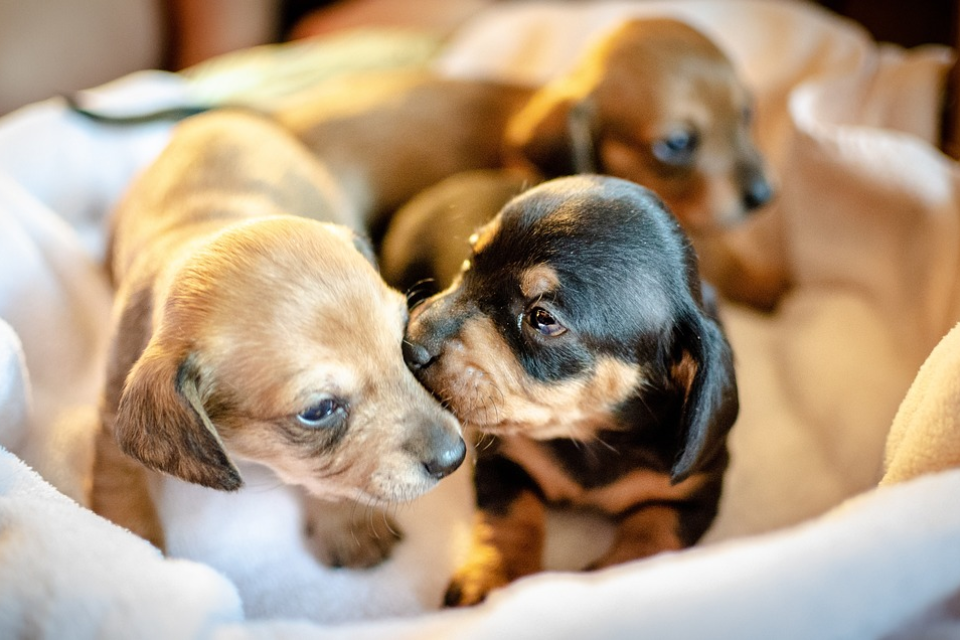Mini dachshunds are a popular and beloved breed of small dogs that have captured the hearts of people all over the world. Known for their long, low bodies and friendly personalities, mini dachshunds are often called wiener dogs, sausage dogs, or doxies. They come in a variety of colors and coat types, from smooth and shiny to long and fluffy.
For breeders and pet owners alike, it is important to understand the reproductive health of mini dachshunds and the size of their litters. This information can help ensure that mother dogs are healthy and happy during pregnancy and that puppies are well-cared for after they are born.
In this blog post, we will explore the world of mini dachshunds and their reproductive habits, answering the question of how many puppies mini dachshunds typically have. We will also discuss the controversies and misconceptions surrounding these beloved dogs, and look at some exciting developments and future prospects for the breed. Let’s dive in!
Key Takeaways:
- Mini dachshunds typically have litters of 2-4 puppies, but larger litters are possible.
- Proper breeding practices and prenatal care are essential for the health of both mother and puppies.
- There are common misconceptions and controversies surrounding mini dachshund reproduction, so it’s important to do your research before breeding or purchasing a puppy.
Mini dachshunds: history and characteristics
Mini dachshunds have a rich and fascinating history, dating back to the 16th century when they were first bred in Germany as hunting dogs. The word “dachshund” comes from the German words “dachs” (badger) and “hund” (dog), and the breed was originally developed to hunt badgers and other small game, thanks to their long and narrow bodies that allowed them to burrow into tight spaces.
Over time, mini dachshunds became popular as companion dogs as well as hunting dogs. They were first recognized by the American Kennel Club (AKC) in 1885, and have since become one of the most beloved breeds in the United States and around the world.
Mini dachshunds are characterized by their unique appearance, with their long, low bodies and short legs. They come in a variety of colors and coat types, including smooth, long, and wire-haired. They are also known for their playful and affectionate personalities, and are often described as loyal and courageous.
One of the most notable features of mini dachshunds is their adaptability. Despite their small size, they are well-suited to living in a variety of environments, from apartments to large houses. They are also great with children and other pets, and can make excellent family pets.
However, like all breeds, mini dachshunds have their own set of health issues and challenges. They are prone to back problems and spinal injuries, which can be exacerbated by their long bodies and short legs. They may also be at risk for other health conditions such as hip dysplasia, heart disease, and dental problems.
Despite these challenges, mini dachshunds remain a beloved breed among dog lovers all over the world. With their unique appearance, playful personalities, and adaptability, they are sure to continue capturing the hearts of people for years to come.
Mini dachshunds: reproduction and pregnancy
Mini Dachshunds are known to be excellent breeders, with many capable of producing several litters in their lifetime. However, it is important to note that breeding should only be done under certain circumstances, and with proper knowledge and understanding of the breed’s reproductive system.
Mating and pregnancy
Mini Dachshunds can start breeding as early as six months of age, but it is generally recommended to wait until they are at least a year old before breeding. Breeding too early can result in health complications for both the mother and her puppies.
When it comes to mating, it is important to remember that Dachshunds are a breed that can easily experience back injuries, especially during pregnancy. Therefore, it is recommended to choose a mate that is smaller in size to reduce the risk of injury to the female.
Pregnancy in Mini Dachshunds usually lasts around 63 days, with the litter size ranging from one to six puppies. The size of the litter can be influenced by various factors, such as the age and health of the mother, the size of the litter in previous pregnancies, and the breeding process itself.
Related: How Often Do Mini Dachshunds Go Into Heat?
Care during pregnancy
Proper care and attention during pregnancy are crucial for the health of both the mother and her puppies. It is recommended to take the expectant mother for regular check-ups with a veterinarian, especially in the later stages of pregnancy.
During pregnancy, Mini Dachshunds may experience a loss of appetite or nausea, which can lead to weight loss. It is important to provide them with high-quality, nutritious food and to monitor their weight and general health regularly.
Birth and postnatal care
Mini Dachshunds usually have no issues with giving birth naturally, but it is important to monitor them closely during the process. If there are any signs of difficulty or distress, it is important to seek veterinary assistance immediately.
After birth, the mother should be given plenty of rest and care, as she may be exhausted and in need of recovery. Puppies should be monitored closely for signs of health issues or defects, and they should receive proper nutrition and care to ensure healthy growth and development.
How many puppies do mini dachshunds have?
How many puppies do mini dachshunds have? It’s a question that many prospective owners of these adorable dogs may ask themselves. The answer, as with many things in life, is not so simple.
Miniature dachshunds are known for having relatively small litters compared to other dog breeds. On average, a mini dachshund litter consists of around 4 puppies, although litters can range anywhere from 1 to 6 puppies. It’s rare for a mini dachshund to have more than 6 puppies in a litter.
There are a few factors that can influence the size of a mini dachshund’s litter. Age is a significant factor. Typically, younger females tend to have smaller litters, while older females tend to have larger litters. The size of the sire can also play a role in determining litter size. Larger sires tend to produce larger litters, while smaller sires tend to produce smaller litters.
Another factor that can influence the size of a mini dachshund’s litter is the health of the mother. If a female is in poor health or has underlying medical issues, it may affect the number of puppies she is able to carry to term. Additionally, environmental factors, such as stress or inadequate nutrition, can impact litter size.
It’s worth noting that while mini dachshunds tend to have smaller litters compared to other breeds, this doesn’t necessarily mean they are any less desirable as pets. In fact, many people specifically seek out mini dachshunds for their smaller size and lower maintenance needs.
Overall, mini dachshunds typically have litters of around 4 puppies, but litters can range from 1 to 6 puppies. There are several factors that can influence litter size, including the age and health of the mother, the size of the sire, and environmental factors.
Conclusion
In conclusion, mini dachshunds are a popular breed of dog known for their unique appearance and charming personality. They are great family pets and make excellent companions for individuals and families alike. However, it is important to be aware of their reproductive health and to ensure proper care during their pregnancy and delivery. The size of a mini dachshund’s litter can vary, but generally, they will have between 1 and 6 puppies. There are also some controversies and misconceptions surrounding mini dachshunds, including their predisposition to certain health issues and their suitability as apartment pets. However, with proper care and attention, mini dachshunds can lead happy and healthy lives.
If you are considering adding a mini dachshund to your family, it is important to do your research and find a reputable breeder. Make sure to ask questions and ensure that the puppies are being raised in a healthy and humane environment. With the right care and attention, a mini dachshund can make a wonderful addition to your family and bring years of joy and companionship.

